When it comes to composing music, the music composers are not going to be sitting with a pencil and some sheets of paper, but make use of pianos to compose the best music that is supported by the software. But it is important to choose the best piano for composing music and they are available in different genres and budgets and are capable of adapting to both the studio and the home environment. We have chosen the best digital pianos for composing here from the leading brands and have made sure that all of them are capable of hooking up with a PC and software app to start playing great music.
Pros Of Training With A Professional
- You can keep up with regular practice with the aid of your piano teacher. Even when you don’t feel like practicing or believe you don’t have time because of your hectic schedule, understanding that somebody else is tracking your improvement each week will encourage you to do so. A piano teacher can also make you responsible for the precision of your practice. When you practice alone, it’s simple to overlook little errors or allow unhealthy habits to take hold. However, you are far more likely to pay attention to every little detail when you practice if you are aware that a teacher will most likely notice these things.
- There are a lot of approaches you can use when learning the piano. Understanding that there isn’t always a right or incorrect way to learn is crucial. Finding the ideal method for learning the piano will be made easier if you work with a professional who has had a lot of teaching experience.
- You most likely fall into one of these categories or a hybrid of them all. Your music teacher can assist you in better comprehending your learning preferences and provide you the tools you need to excel in the subject matter. But more crucially, a piano teacher can assist you in identifying your difficulties and overcoming the aspects of learning the piano that seem difficult or out of your reach.
- There are several benefits to having accessibility to your own specialist who is committed to responding to your own particular questions. Yes, you can use Google to search for information and find a tone of results, but Google is unaware of your particular circumstances.
- It will be easier for you to put the components of the musical puzzles together if you have a real person to learn from because many questions that come up at the piano really seem to be situational.
- Similar to this, a piano instructor can assist you in resolving issues with your practice routine.
Are you consistently making the same error?
Does something about your music sound off?
Do your fingers ever appear to want to be uncooperative at times?
Do you feel as though your progress has halted?
All of these typical issues are likely to have several solutions available to a piano teacher. Imagine how much faster you would learn the keyboard if you could face every challenge head-on rather than relying on your own initiative to figure out the answers.
- It’s likely that working with a teacher may introduce you to a variety of new musical genres, musical styles, and musical concepts. Again, you can learn these things online without a doubt, but piano teachers have access to the most recent developments in the piano field. Additionally, they can draw on decades of their own experience.
- A collection of piano music is typically available to piano teachers, and they are skilled at preparing you for success. Your piano instructor can show you a plethora of new music which you probably weren’t even aware of.
- You’ll be more likely to stick with the piano over the long haul if you study with a piano teacher. You can’t learn to play the piano in a single night or in sporadic, brief sessions. Instead, improving at the piano requires time and effort.
- As you learn to play the piano, you’ll go through many highs and lows. Depending on the season, your progress will go at a different rate. You could feel like you’re moving quickly at times, but you might also think that you’re losing ground.
- It will be easier for you to grasp why it’s worthwhile to persevere if you have a piano teacher who will support you along the way. Your piano teacher will motivate you to continue pushing and remind you of why you originally wanted to learn the piano even when it seems like you are not making progress, you are too busy to practice, or learning the piano is becoming too difficult. If you persevere, you’ll reap the benefits and happiness that playing piano offers for many years to come.
Digital Or Classical Piano. Which Is Better For Composing?
A digital piano is a very adaptable instrument because it can mimic many other sounds. There are countless different instrument sounds and tones to assist you create and experiment with your musical composition, from electronic organs to harpsichords to synth sounds.
Any pianist must be able to play a piece at the correct tempo and rhythm. A built-in metronome is useful in situations like this. Beginners can improve the piano playing skills by using a metronome, which can be adjusted for any pace and tempo.
How Is Digital Music Better For Composing?
Acoustic pianos have been replaced by digital pianos as more contemporary pianos. The digital piano is an invention that only recently gained widespread acceptance because it has electronic circuits and needs power to function.
Speaking of sounds, a digital piano delivers dozens, if not hundreds, of various piano and organ tones, while an acoustic piano could only produce a single timbre. This indicates that you are not constrained to a specific sound. Instead, you may instantly alter a piano patch to fit various musical styles or even specific songs.
You get the same hammer action and sensation from the keys as you would with a classical piano. Therefore, switching from an acoustic piano to a digital piano won’t feel as strange if you’re already accustomed to playing one, and vice versa. A digital piano’s weighted keys allow you to play notes similarly to an acoustic piano. For some, you may even change the sensitivity to fit your playing preferences!
Speaking of articulation, new digital pianos can pick up and transmit subtleties in your playing with extreme precision. Built-in sensors allow for the identification of the key-pressing velocity. The sampled note can then be played back on the piano with the appropriate volume and intensity. This guarantees a realistic and, most crucially, human sound while ensuring that the playing dynamics are not hampered.
Does The Home Environment Disturb Composing? Should I Compose Only In A Studio?
In the end, nothing can truly compare to the entire enjoyment that comes from writing music traditionally in a piano’s studio. Even though it is nice, the home atmosphere can be dull and distracting.
Due to these interruptions, you might not be able to think of ideas quickly, and no one will be around to point out your mistakes if you play the piano incorrectly. If you’re writing at home, which is only your resting place, you’ll miss out on this one-on-one interaction with the piano in the studio and other qualified, experienced professionals around. Similar to the proverb “don’t bring work to home, and don’t take home to with you,” music composition should only be done in an enclosed location that supports producing music of the finest quality.
Table of Contents
- Pros Of Training With A Professional
- Digital Or Classical Piano. Which Is Better For Composing?
- How Is Digital Music Better For Composing?
- Does The Home Environment Disturb Composing? Should I Compose Only In A Studio?
- Top 5 Best Digital Pianos for Composing
- #1. Casio Privia PX-870 Digital Piano – Best Overall
- #2. Yamaha YDP-144 Arius Series Piano – Editor’s Pick for Composing
- #3. Yamaha YDP184 Digital Piano – Great Choice for Professionals
- #4. Donner DDP-100 Digital Piano – Budget Pick for Composing
- #5. Yamaha P125 Digital Piano – Portable Choice for Composing
- Things To Consider Before Choosing To Buy A Digital Piano For Composing
- Final Words
- Frequently Asked Questions (FAQs)
- 1. Give some pros of learning piano online on your own
- 2. How does a classical/ acoustic piano work?
- 3. How does an acoustic piano feel like to play?
- 4.How does maintaining a digital piano differ from maintaining an acoustic piano?
- 5. What are some benefits of learning piano?
- 6. How does piano help in strengthening hand and eye coordination?
- 7. Can playing piano make us healthy?
Top 5 Best Digital Pianos for Composing
The following are the best digital pianos for composing and are capable of rendering amazing sounds that are similar to the grand pianos and they also offer a range of options to mix music and share compositions.
#1. Casio Privia PX-870 Digital Piano – Best Overall
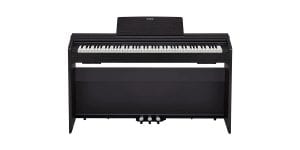
| Features | Rating |
| Performance and sounds | 9.1 |
| Connectivity | 8.9 |
| Build Quality | 9 |
| Value for money | 9.2 |
This is a great piano from the Casio brand that is meant for composing great tunes. This is a lightweight piano that weighs around 75.62 pounds. The Casio PX-870 features around 19 instrument tunes and can layer and split the piano tunes as desired. This piano features an exceptional touch response and has three sensitivity levels. The piano has a generous 256 notes polyphony that helps us play great tunes for complex performances and it will also sound perfect and natural.
This Privia digital piano from Casio features a tri-sensor scaled hammer action keyboard with an incredible feel and it is also capable of capturing the dynamics of the piano performance with unparalleled accuracy and speed. This piano has a powerful 40-watt four-speaker system that is designed to envelop the audience, the listener, and the room with rich and detailed sound.
The Volume Sync EQ feature of this piano ensures that the piano players listen to a clear and balanced sound across the diverse frequency range at all desired volume levels. The class-compliant USB connectivity of this piano helps it in connecting with the Mac and the Windows computer, without any requirement to download any drivers. Its AiR sound engine offers highly accurate grand piano sounds with exceptional dynamics for a remarkably powerful and expressive performance.
Pros
- The new flagship model of the world-renowned Privia line of digital pianos is designed to give the players a true piano experience.
- Its stylish slim-line design and dynamic new sound projection speaker system make it the best digital piano of all time.
- The Casio Privia digital piano is suitable for all piano players.
- Its New AiR sound engine includes damper and action noise.
Cons
- The keyboard is very heavy and is not portable.
- We don’t get music scores for the built-in songs of this piano.
Note: This piano is also featured in our list of best home digital pianos.
#2. Yamaha YDP-144 Arius Series Piano – Editor’s Pick for Composing
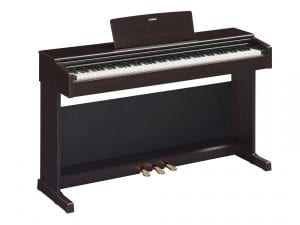
| Features | Rating |
| Performance and sounds | 9.4 |
| Connectivity | 9.3 |
| Build Quality | 9.1 |
| Value for money | 9.5 |
This is a great piano from the legendary piano brand and is made of high-quality dark rosewood material. The purchase includes one YDP-144 piano model, piano bench, 50 classical music masterpiece books, an owner’s manual, and an operations guide. The piano comes with three pedals and has a maximum polyphony of 192. The number of included voices in this digital piano is ten and it also comes with two standard stereo phone jacks with playback and recording capabilities.
The digital piano features GHS weighted action keyboard that is heavier in the lower keys and lighter in the higher end, similar to the acoustic piano. Its weighted keys reproduce the controlled and responsive touch of acoustic piano sounds. Its half-damper pedal controls help in increasing the amount of sustain continuously, as the pedal is depressed. This CFX premium grand piano voice recreates the power and the tone of the flagship concert grand piano from Yamaha.
Its special matte black key tops are designed to absorb maximum moisture and these remain tactile even after extended use, without getting slippery. This legendary digital piano from Yamaha is crafted for the most prestigious concert halls of the world and it recreates the touch of the Yamaha acoustic piano and the flagship CFX concert grand sound to fit the home. Its VRM technology recreates the resonance of the soundboard, rim, and frame to emulate the natural feeling of the acoustic piano.
Pros
- The piano features advanced technology for an exceptional piano playing experience.
- The Arius model features stylish designs and graceful curves.
- We can simply connect the piano with any smart device through USB.
- There are three pedals and two headphones jack on this piano.
Cons
- The piano doesn’t come with a padded seat or bench.
- The sounds are not exactly acoustic but are close enough.
Note: This piano is also featured in our lists of the best advanced digital pianos and best pianos under $2000.
#3. Yamaha YDP184 Digital Piano – Great Choice for Professionals
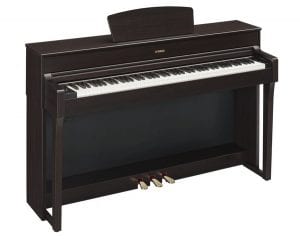
| Features | Rating |
| Performance and sounds | 9.6 |
| Connectivity | 9.2 |
| Easy to Assemble | 9.4 |
| Build Quality | 9.3 |
| Value for money | 9.5 |
YDP184 is a great digital piano from the Yamaha brand and it is capable of recreating the tone and power of the flagship CFX concert grand piano from Yamaha. It features a graded hammer 3 action keyboard with synthetic ivory key tops. Its weighted keys help to reproduce the controlled and responsive touch for the players. They help in adding a tactile surface to the white keys and are capable of absorbing moisture from the fingers and preventing slippage of the fingers from the keys, even during strenuous piano playing.
The piano features virtual resonance modeling technology that allows players to a vivid and richly varied piano expression. The piano has a full dot LCD that allows for smooth navigation of the features and the functions of the instrument. The instrument comes with a padded bench, power supply, music stand, and sheet music book. The number of polyphony in this instrument is about 128.
The instrument has a powerful grand piano tone, thanks to the state-of-the-art recording method that helps in recreating the iconic Yamaha CFX sound. The VRM or the virtual resonance modeling helps in recreating the resonance of the soundboard, frame, and rim to emulate the natural feeling of the acoustic piano, even while using headphones. It works great with smart devices with the help of a smart pianist app.
Pros
- This acoustic piano has three pedals with unlimited expression.
- The VRM resonance modeling technology of this piano emulates the natural feeling of an acoustic piano.
- This is a great piano for professional musicians as well.
- This piano is a beautiful piece of furniture that offers weighted keys and rich sound.
Cons
- Heavy piano that is tough to carry.
- The hanger of the headphones has little clearance to put the headphones in.
- There is no Bluetooth or WIFI connectivity in this piano.
Note: This piano is also featured in our lists of the top 15 pianos in the market and best digital pianos under $5000.
#4. Donner DDP-100 Digital Piano – Budget Pick for Composing
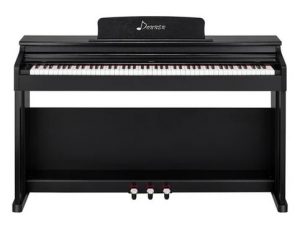
| Features | Rating |
| Performance and sounds | 9.5 |
| Connectivity | 9.1 |
| Build Quality | 8.7 |
| Value for money | 9.6 |
DDP-100 is a great digital piano that comes as a complete beginner’s bundle with a furniture stand, triple pedals, power adapter, and MP3 function. This is an attractive piano that comes in elegant black color. This is an 88-keys fully weighted digital piano with great key action that matches the finger strength precisely. The piano keys offer a stable and better feel, restoring the strength of the finger. The sounds of this digital piano are realistic and excellent and help the music composers to distinguish sounds clearly.
This digital piano features a built-in amplifier and its keyboards are also capable of supporting the external sounds, to meet the requirements of the players on different occasions. The piano features a wooden cabinet and a streamlined design and it also features a sliding key cover to help keep the keyboard keys protected. It features an exceptional sound action with 128-note polyphony and its tones are sampled purely from real acoustic grand pianos.
Donner is a great keyboard brand, that is committed to creating exceptional user experiences when it comes to music performance. It is a pioneer in music performance and caters to the needs of the pianist from all over the world, especially professional artists and pianists. The piano features an impressive sound quality and its AWM dynamic samples produce richer, broader, and deeper sounds.
Pros
- This is one of the high-quality and affordable music instruments from the Donner brand.
- The piano is constructed from high-quality wood.
- It features a three-dimensional soundscape, emitting full-range tones.
- The piano connects with a convenient mobile app that can be accessed anytime and anywhere.
Cons
- The sounds of this piano seem somewhat electronic.
Note: This piano is also featured in our lists of best intermediate pianos and best pianos for classical pianists.
#5. Yamaha P125 Digital Piano – Portable Choice for Composing

| Features | Rating |
| Performance and sounds | 9.5 |
| Connectivity | 9.3 |
| Build Quality | 9.2 |
| Value for money | 9.6 |
This is a great piano that comes with a sustain pedal, in elegant white color. The best thing about this piano that impresses composers is its portable design and it weighs only 18 pounds. It is a completely weighted digital piano that features 88- full-sized piano-style keys. Its GHS weighted hammer action keys are heavier at the lower keys and lighter at the higher keys, similar to an acoustic piano.
This digital piano from the legendary Yamaha brand features a pure CF sound engine that reproduces the authentic sounds and tone of the Yamaha 9’ CFIIS concert grand digital pianos. The split mode in this piano helps to play different voices with each hand simultaneously. The piano also holds ample connectivity features and its USB to host connectivity feature with MIDI and audio transfer potentials makes sure that the player requires only one cable to connect the instrument with the music-making software.
The Yamaha P125 is a compact 88-key weighted digital piano that combines exceptional piano performance with a minimalistic and user-friendly design. The P125 is loaded is great features to offer a great acoustic piano playing experience in a portable package. The piano is capable of producing high-quality and dynamic sound and a natural piano tough response while maintaining a slim and sleek footprint.
Pros
- The graded hammer standard 88-key piano keyboard feels similar to an acoustic piano to touch.
- It features a new, two-way improved speaker system that produces expansive piano sounds in all directions.
- It is compatible with a smart pianist app to select the settings, rhythms, and voices.
- Helps the composers to stay focused on their performance and is designed with simplicity and ease of use in mind.
Cons
- The keyboard doesn’t come with a case.
- The speakers of this piano are not very great.
Note: This piano is also featured in our list of best beginner digital keyboards and best pianos under $700.
Things To Consider Before Choosing To Buy A Digital Piano For Composing
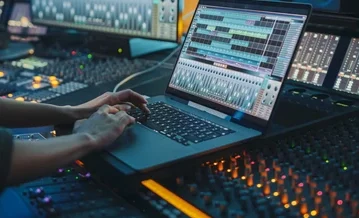
The following are some of the important factors to consider before choosing to buy a digital piano.
1. Keyboard – weighted or non-weighted?
The electronic keyboard comes with weighted keys and some of them have non-weighted keys. The pianos that feature weighted keyboards render a better piano playing experience and also render the right quantum of resistance, to help the pianist feel authentic about the piano playing experience. Weighted key beds are also highly responsive and are capable of rendering a spectrum of sounds, to enhance performance.
2. Acoustic vs digital pianos
The acoustic pianos are the original high-quality pianos that are capable of rendering high-quality tunes for original music compositions. But they are not everybody’s piece of cake. They are huge with a wooden exterior and are also costly. The digital pianos on the other hand are a modern version of the traditional acoustic pianos. They produce digital sounds and are compact and lightweight. They are also capable of connecting with digital devices through mobile apps and Bluetooth connectivity.
3. Portability
It is important to buy a portable digital piano so that we can take them to the studio for playing and practicing music on the go. The portable pianos are compact and lighter and can be stored easily as well.
Check out: Best Digital Pianos Under $1000
4. Connectivity features
Most of these pianos also have additional options such as Bluetooth connectivity, LED displays, recording playback, and a lot of other features. Composers should look for pianos with MIDI capability, that allows them to connect with the mobile app, computer, and even a USB port, to connect with other devices.
Final Words
Most digital pianos have several additional options that make them very easy to play with, for music composers. We hope our buying guide and our product recommendations help you to buy the best digital piano for your music journey.
Frequently Asked Questions (FAQs)
1. Give some pros of learning piano online on your own
- Depending on your preferences and level of knowledge, you can select a basic, moderate, or advanced level.
- These piano classes are made to teach you the fundamentals, so you don’t need to have any prior musical training or understanding of the piano instrument.
- When learning the piano, you can choose and choose your own speed and difficulty level. You can even set learning restrictions, particularly if you’re just learning for pleasure.
- There are several ways to reinforce learning, including through movies, pictures, descriptions, apps, etc.
2. How does a classical/ acoustic piano work?
Each key of an acoustic piano is attached to a remember feeling hammer that strikes a cluster of typically three steel wire strings to create sound. The soundboard of a piano, a sizable wooden surface, is then vibrated by the strings, amplifying the sound.
3. How does an acoustic piano feel like to play?
Each key of an acoustic piano is attached to a remember feeling hammer that strikes a cluster of typically three steel wire strings to create sound. The soundboard of a piano, a sizable wooden surface, is then vibrated by the strings, amplifying the sound.
4.How does maintaining a digital piano differ from maintaining an acoustic piano?
There are no strings or hammers on digital pianos. They either employ a synthesized simulation or prerecorded sounds of an acoustic piano in place of an actual instrument. It has sophisticated digital sound technology built in that mimics the feel and sound of an acoustic piano.
A digital piano requires less upkeep than an acoustic one. Because they don’t have any strings or hammers:
They do not have to be tuned or regulated by a skilled tuner.
-Play the piano without even being concerned about out-of-tune keys.
-Neither heat nor humidity will have an impact on your instrument.
5. What are some benefits of learning piano?
The capacity to distinguish between pitches, which is a key skill you gain when playing the piano, was shown in a 1993 study to be related to strong reading performance. Learning to memorize music before a performance also develops your reading comprehension abilities and the memory-related area of your brain.
6. How does piano help in strengthening hand and eye coordination?
It should not come as a surprise that learning to play the piano needs hand eye coordination, but recent research on hand motor control in musicians contends that pianists have altered their cortical mapping to speed up their finger movements.
Learning how to play a piano can test these connections in the brain that control movement in kids and adults with poor motor abilities, and it can even improve coordination.
7. Can playing piano make us healthy?
Although it’s not the elixir of youth, playing the piano comes close! Were you aware that taking classes in your later years can delay the onset of aging? Human growth hormone is produced by your pituitary gland (HgH). This process aids in the regulation of bodily fluids, metabolism, bone and muscle growth, and possibly even heart function.
